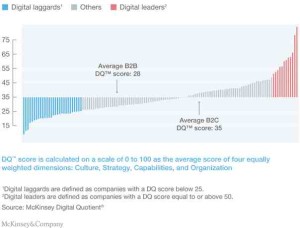By focusing on the right digital practices, B2B companies—currently trailing B2C companies in digital transformation—can create long-term value. Here are six areas where digital leaders excel.
Far from standing on the sidelines, B2B companies have embraced the digital revolution. Most are outpacing consumer companies in digitizing back-office workflows and resource planning and in modernizing their existing IT architectures. But those efforts have tended to focus on internal cost and process efficiencies and less on innovating around sales and the customer experience—and that’s where the real growth is.
Digitization has made providing consistent, high-quality customer interactions a competitive differentiator, no matter the channel. B2B companies need to adjust accordingly. Right now, however, selling models remain firmly planted in the offline world. Company websites, though rich in product descriptions, are often little more than digital brochures that fail to provide an easy way for customers to buy. And while sales teams are working harder to navigate deals that stretch longer and involve multiple influencers and buyers, they often lack (or are unable to apply) the analytics needed to manage the sale profitably, understand who the real decision makers are, and what sorts of outreach might prove persuasive.
It’s not going to get any easier. B2B players must contend with shrinking product shelf lives, greater price transparency, and a changing cost basis on the one hand while simultaneously growing the capabilities needed to create consumer-like experiences on the other, with personalized service and hassle-free purchasing across platforms and devices. Nontraditional players like Amazon Business and Alibaba are already cashing in on this trend by providing business buyers with simple and convenient digital marketplaces.
So what to do? Our research is clear: by investing in a targeted set of digital capabilities and approaches, B2B companies can improve their financial performance—and not just by a percentage point or two. Rather, the B2B companies that master these areas are generating 8 percent more shareholder returns and a revenue compound annual growth rate (CAGR) that is five times greater than the rest of the field.
Over the last three years, McKinsey & Company has measured the Digital Quotient® (DQ™) of approximately 200 B2C and B2B companies around the world by evaluating 18 management practices related to digital strategy, capabilities, culture, and organization that correlate most strongly with growth and profitability. The study shows that B2B companies trail consumer companies in terms of their overall digital maturity: the average DQ score for the 50 B2B companies in our study was 28, compared with 35 for consumer companies. While that might not be surprising—B2B companies, after all, generally contend with a more complex environment, longer deal cycles, lengthy RFP processes, the involvement of many vendors, decision makers, and influencers—comparing the scores of B2B and B2C companies was helpful in order to reveal and better understand those areas where B2B companies could most profitably improve.
….
Our research shows that six digital practices have an outsize impact on performance. These are the areas in which digital leaders excel and where B2B companies can do better.
1. Commitment to digital at a strategic level
2. Creation of consistent experiences online and off
3. Use of data to enable and empower the sales force
4. End-to-end connection of processes to improve insight and decision making
5. Creation of a culture anchored on innovation and execution
6. Willingness to shake up the organizational structure and metrics to support digital aspirations
More in: How B2B digital leaders drive five times more revenue growth than their peers by Tanguy Catlin, Liz Harrison, Candace Lun Plotkin, and Jennifer Stanley
About the author(s): Tanguy Catlin is a senior partner in McKinsey’s Boston office, where Candace Lun Plotkin is director of knowledge and Jennifer Stanley is a partner; Liz Harrison is a consultant in the Charlotte office.
The authors would like to thank Pamela Simon and Marie Glenn for their contributions to this article.
